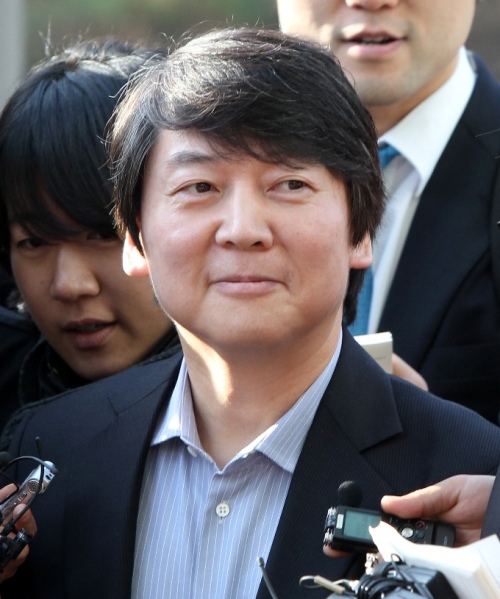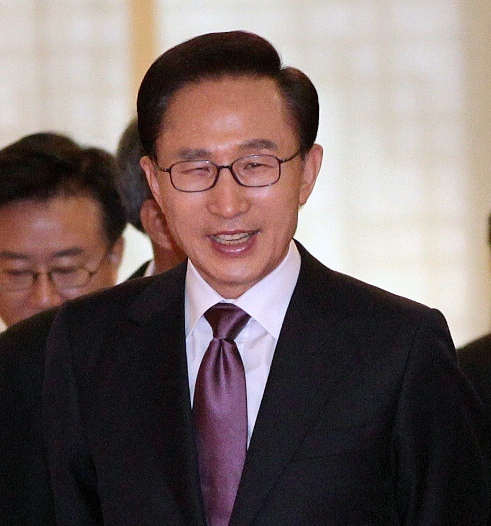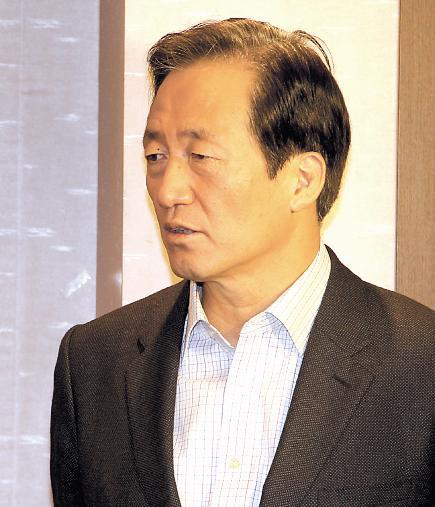
Public not so enthusiastic about presidential hopefuls’ ‘calculated’ acts of giving
On Nov. 15, a throng of reporters waited in front of a graduate school in Suwon, Gyeonggi Province, armed with questions for a man who had returned to the political limelight after pledging to donate a chunk of his wealth to society.
As soon as he got out of his car, Ahn Cheol-soo, dean of Seoul National University’s Graduate School of Convergence Science and Technology, was surrounded by journalists asking about the political implications of the plan he had unveiled the previous day to donate half his stake in an antivirus software company founded by him in 1995.
“I just put into practice what I had long thought of,” said Ahn, who has emerged as a strong potential presidential runner over the past months, while keeping his distance from politics.
“In my lectures and books, I have talked a lot about social responsibility and contribution, and I just acted on it,” he added.
The entrepreneur-turned-professor then disappeared into his office without answering questions on whether the donation was politically motivated and the timing of the announcement.
In an e-mail message to employees of AhnLab, in which he revealed his intention to donate half of his 37.1 percent stake, Ahn said the donation had “no other purpose” than fulfilling his duty as a recipient of greater benefits from society.
Some political observers, however, view his donation, worth 150 billion won ($130 million), as a dramatic way to lay the groundwork for his possible entry into politics.
They note his e-mail message, titled “Dreaming of a Society (Where People) Live Together with Hope,” reads like a statement explaining his political beliefs, and not just reasons for his decision to donate.
“Middle-class livelihoods are collapsing in our society and the young generation is frustrated and lost in despair,” he wrote, indicating that Korea needs its wealthy to contribute to the community.
Political implication
Many people think the timing of his announcement signifies political intentions.
“Ahn may have had some pure intention but his act cannot but cause suspicion of carrying political motives as it came at this sensitive moment,” said Jung Hae-gu, political scientist at Sungkonghoe University.
Jung Jun-young, who majors in sociology at Yonsei University, also said that when Ahn was drawing public attention as a potential candidate in the 2012 presidential race, every action heightening his profile would inevitably be interpreted in a political context.
His donation, the latest in a series of actions that have put him under the media spotlight, proved highly politically effective.
A popularity poll conducted a day after its announcement showed Ahn led Rep. Park Geun-hye of the ruling Grand National Party by nearly 6 percentage points in a head-to-head match up. Ahn was also tied with Park in topping the list of all presidential hopefuls with an approval rating of 33.7 percent. The results were certain to have unnerved the former GNP chairwoman, daughter of late President Park Chung-hee, who had kept her status as the undisputed presidential front-runner until Ahn’s emergence.
Park said she thought Ahn’s donation was a good thing when asked by reporters for comment, with her aides regarding it as a virtual declaration he would enter politics.
Ahn has shaken the political establishment since hinting at a possible challenge for Seoul mayoralty in early September, sparking an enthusiastic following among younger voters fed up with the major parties preoccupied with partisan disputes and uninterested in easing their difficulties. Days later, he withdrew his bid and instead threw his support behind nonpartisan civic activist Park Won-soon and showed up at Park’s campaign headquarters shortly before the Oct. 26 mayoral by-election to deliver a letter reaffirming his backing.
Some political observers see Ahn’s latest act, which came after three weeks’ retreat from public view, as carefully calculated. Courted by political circles to join them over the period, Ahn may have wanted to maximize the effect of his donation by coming up with decent cause in contrast to partisan demands.
If his decision came later, public suspicion would be reinforced that it was politically motivated to boost his position down the road toward the presidential election set for December 2012. His donation is now set to be followed by an event to celebrate the publication of his new book in January.
Some observers also note Ahn may have felt burdened by the increase in his company’s share price, which has led to criticism that his recent moves have just resulted in profits for him.
More conspicuous cases
Ahn’s case reminded the public of previous donations with more obvious political intentions.
On the final stretch of his 2007 presidential campaign, GNP candidate Lee Myung-bak pledged to give away 33 billion won of his personal assets to help the underprivileged. Two years after his election, Lee, a former construction firm CEO, launched a scholarship foundation to support students from poor families.
On Nov. 15, a throng of reporters waited in front of a graduate school in Suwon, Gyeonggi Province, armed with questions for a man who had returned to the political limelight after pledging to donate a chunk of his wealth to society.
As soon as he got out of his car, Ahn Cheol-soo, dean of Seoul National University’s Graduate School of Convergence Science and Technology, was surrounded by journalists asking about the political implications of the plan he had unveiled the previous day to donate half his stake in an antivirus software company founded by him in 1995.
“I just put into practice what I had long thought of,” said Ahn, who has emerged as a strong potential presidential runner over the past months, while keeping his distance from politics.
“In my lectures and books, I have talked a lot about social responsibility and contribution, and I just acted on it,” he added.
The entrepreneur-turned-professor then disappeared into his office without answering questions on whether the donation was politically motivated and the timing of the announcement.
In an e-mail message to employees of AhnLab, in which he revealed his intention to donate half of his 37.1 percent stake, Ahn said the donation had “no other purpose” than fulfilling his duty as a recipient of greater benefits from society.
Some political observers, however, view his donation, worth 150 billion won ($130 million), as a dramatic way to lay the groundwork for his possible entry into politics.
They note his e-mail message, titled “Dreaming of a Society (Where People) Live Together with Hope,” reads like a statement explaining his political beliefs, and not just reasons for his decision to donate.
“Middle-class livelihoods are collapsing in our society and the young generation is frustrated and lost in despair,” he wrote, indicating that Korea needs its wealthy to contribute to the community.
Political implication
Many people think the timing of his announcement signifies political intentions.
“Ahn may have had some pure intention but his act cannot but cause suspicion of carrying political motives as it came at this sensitive moment,” said Jung Hae-gu, political scientist at Sungkonghoe University.
Jung Jun-young, who majors in sociology at Yonsei University, also said that when Ahn was drawing public attention as a potential candidate in the 2012 presidential race, every action heightening his profile would inevitably be interpreted in a political context.
His donation, the latest in a series of actions that have put him under the media spotlight, proved highly politically effective.
A popularity poll conducted a day after its announcement showed Ahn led Rep. Park Geun-hye of the ruling Grand National Party by nearly 6 percentage points in a head-to-head match up. Ahn was also tied with Park in topping the list of all presidential hopefuls with an approval rating of 33.7 percent. The results were certain to have unnerved the former GNP chairwoman, daughter of late President Park Chung-hee, who had kept her status as the undisputed presidential front-runner until Ahn’s emergence.
Park said she thought Ahn’s donation was a good thing when asked by reporters for comment, with her aides regarding it as a virtual declaration he would enter politics.
Ahn has shaken the political establishment since hinting at a possible challenge for Seoul mayoralty in early September, sparking an enthusiastic following among younger voters fed up with the major parties preoccupied with partisan disputes and uninterested in easing their difficulties. Days later, he withdrew his bid and instead threw his support behind nonpartisan civic activist Park Won-soon and showed up at Park’s campaign headquarters shortly before the Oct. 26 mayoral by-election to deliver a letter reaffirming his backing.
Some political observers see Ahn’s latest act, which came after three weeks’ retreat from public view, as carefully calculated. Courted by political circles to join them over the period, Ahn may have wanted to maximize the effect of his donation by coming up with decent cause in contrast to partisan demands.
If his decision came later, public suspicion would be reinforced that it was politically motivated to boost his position down the road toward the presidential election set for December 2012. His donation is now set to be followed by an event to celebrate the publication of his new book in January.
Some observers also note Ahn may have felt burdened by the increase in his company’s share price, which has led to criticism that his recent moves have just resulted in profits for him.
More conspicuous cases
Ahn’s case reminded the public of previous donations with more obvious political intentions.
On the final stretch of his 2007 presidential campaign, GNP candidate Lee Myung-bak pledged to give away 33 billion won of his personal assets to help the underprivileged. Two years after his election, Lee, a former construction firm CEO, launched a scholarship foundation to support students from poor families.


Former GNP chairman and presidential hopeful Rep. Chung Mong-joon committed himself in August to donating 200 billion won from his private coffers to set up a charity foundation also funded by a shipbuilder he owns and other companies bearing the Hyundai name. While his aides said the move was intended to continue the giving spirit of his late father and Hyundai Group founder Chung Ju-yung, many people viewed it as at least partly aimed at raising his profile in the run-up to next year’s presidential election.
At the start of the year, former President Kim Young-sam announced he would donate his personal wealth worth 5.2 billion won to a foundation designed to promote his pro-democracy activities.
Lee’s campaign promise to donate personal wealth seemed to help water down the controversy over the way he accumulated his fortune. Chung, who is preparing to launch his second presidential challenge, has not seen his donation improve his approval rating.
The lawmaker described Ahn’s donation as “very good thing,” hoping it would help spread a culture of giving throughout society. Chung said he was ready to give advice to Ahn if they happened to meet, indicating they have similar experiences in donating.
Ahn’s donation, like those by Lee and Chung, may be a strategy to differentiate himself from other professional politicians by using his achievement as an entrepreneur.
But political observers note his act will bring about a more fundamental effect, coupled with his keywords of “public interest,” “dedication,” “sharing” and “common sense.”
His approach, if he does run for president, might overhaul the political landscape, tearing down the longstanding conservative-liberal paradigm.
In his e-mail message, Ahn hoped his donation would be used to help educate children from low-income families. A GNP official said what Ahn has advocated would further resonate through political circles if supported by programs funded by his donation, leaving Park and other potential presidential candidates with little means to counter it. Some say the former GNP chairwoman may be pushed to make her own donation in some form before next year’s presidential election.
A foundation, expected to be established to follow up with his donation, may serve as a foothold to stage his presidential bid, whether he joins an existing party or launches a new one, analysts say. Revealing his plan, Ahn wished more people would show interest and participate in his cause.
Unenthusiastic response
The public has not responded enthusiastically to donations made with political intent.
“Donation itself is a good thing. But it will not bring about good results if donation is made for a political purpose,” said professor Jung of Sungkonghoe University. “It is not desirable to attempt to buy popularity with money.”
A 34-year-old company official, who wished to remain anonymous, said politicians in Korea appear to set the timing of donations to pave the way for further political gains.
“I think their donation will be made more noble if they give away their wealth after major elections or retirement from the political scene,” he said.
Yonsei University student Jung said he feels uncomfortable with donations that have so far been made by presidential hopefuls.
“I think those challenging for the nation’s top public post should try to win voters’ hearts with their vision and solutions to problems facing the country,” he said.
The public has also shown a negative response to the practice of affluent politicians setting up a foundation whose operating staff is usually filled with their family members or associates, instead of giving away personal wealth to charity.
Except for some high-profile cases of giving, few other Korean politicians have made so large donations. According to Charity Korea, there is no politician among the 46 members of its honor society, who have donated more than 100 million won each.
Political observers note a series of donations by presidential runners or hopefuls, though not accepted by the public wholeheartedly, reflects Koreans’ traditional perception that power and wealth should not be left in the same hands.
“Korean people seem to have a strong antipathy against someone with both power and wealth,” said Sunkonghoe University professor Jung.
Yonsei University student Jung said efforts are needed so the voters can check against the integration of power and wealth.
By Kim Kyung-ho (khkkim@heraldcorp.com)
-
Articles by Korea Herald







![[KH Explains] Hyundai's full hybrid edge to pay off amid slow transition to pure EVs](http://res.heraldm.com/phpwas/restmb_idxmake.php?idx=644&simg=/content/image/2024/04/18/20240418050645_0.jpg&u=20240419100350)







![[From the Scene] Monks, Buddhists hail return of remains of Buddhas](http://res.heraldm.com/phpwas/restmb_idxmake.php?idx=652&simg=/content/image/2024/04/19/20240419050617_0.jpg&u=20240419175937)

![[KH Explains] Hyundai's full hybrid edge to pay off amid slow transition to pure EVs](http://res.heraldm.com/phpwas/restmb_idxmake.php?idx=652&simg=/content/image/2024/04/18/20240418050645_0.jpg&u=20240419100350)

![[Today’s K-pop] Illit drops debut single remix](http://res.heraldm.com/phpwas/restmb_idxmake.php?idx=642&simg=/content/image/2024/04/19/20240419050612_0.jpg&u=)